Fire Emblem Fates: Birthright (Nintendo 3DS) Review
By Renan Fontes  12.04.2016
12.04.2016
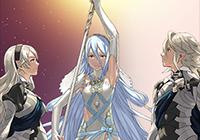
There was a fair bit of controversy when Nintendo announced that the latest romp in the Fire Emblem series would be split into two parts, with one final part as DLC. Fans were very understandably concerned that they wouldn't be getting their money's worth by purchasing just one version. Nintendo had already opened the DLC floodgates to mixed results with the series' previous instalment Fire Emblem: Awakening, and multiple versions of the same game didn't land too well. After more information and trailers came out, however, Nintendo was able to reel the majority of the fanbase back in, promising enough differences between all three versions. The questions remain, though: are all three versions really different enough to justify the split, and is Birthright capable of standing on its own as an individual experience?
Returning from the two previous instalments is the Avatar feature. In the previous entries, the Avatar mechanic was a simple way of allowing self-insertion into the story without compromising the plot and narrative (though less so in Awakening). Fates takes it to a whole new level, merging the Lord role with the Avatar role completely. By merging the role of main character with the role of self-insert, Fates either sets itself up as an incredibly immersive or one that shamelessly panders to its protagonist. Unfortunately, it's the latter.
Corrin/Kamui/Insert Name Here is perhaps the worst main character to ever grace a Fire Emblem title. Corrin starts out incredibly promising, sheltered from the outside world and being posed an incredibly difficult and genuinely thoughtful question; do they betray their adopted family and side with a victimized country, or did they forgo their Birthright and stand with their kidnappers? Birthright sees Corrin siding with the former, going over to Hoshido to fight the war against Nohr with their adoptive siblings they have just met.
The concept of Corrin's arc is incredibly strong and sets up several emotional moments to come as the opening chapters do a great job at fleshing out the now betrayed Nohrian siblings. Unfortunately, the development for the Nohr characters ceases as soon as Corrin makes their decision to side with Hoshido, causing any potentially impactful moments to feel stiff as they require character context from Conquest to have the right amount of weight.
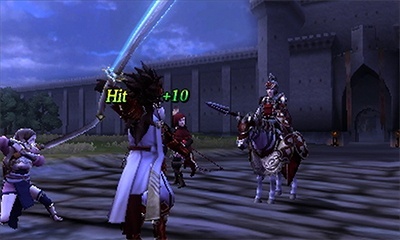
For a series that's so story and character driven, refining the writing and making sure the narrative works is incredibly important, but Birthright feels very lacking in this regard. Support conversations, the series' main way of character development, feel gimmickier than ever. Units rarely have more than a few traits that get fleshed out, and the insistence of making sure everyone can marry anyone returns from the last instalment. Changing otherwise platonic relationships into romantic for the sake of eugenics did not come off naturally in Awakening, and they feel downright abnormal and forced.
On the subject of eugenics, child units return from the previous entry, albeit sloppily. Before, child units were a part of the plot and served an important thematic purpose. This time around, they exist because Intelligent Systems realized child units made them money. Their integration into the main plot is downright mind boggling. When two character have a child, they ship them away to an alternate dimension where they grow up on a different timeline until they're inevitably recruited to fight in Corrin's army. They effect nothing, are ignored by everyone outside of support conversations, and serve only to taint the few likable characters the game has.
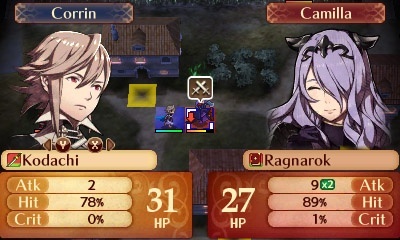
The story, characters, and writing are all pitifully below average for the series, but that doesn't mean Birthright can't be salvaged. The map design itself is significantly improved from Awakening, featuring incredibly creative layouts that require genuine strategy to beat. Difficulty-wise, however, Birthright is overall far more challenging than its predecessor. Where Awakening's difficulty severely dropped off after the first five or so chapters, Birthright manages to keep up a good balance up until endgame. From a purely gameplay perspective, a lot of mistakes from the previous entry have been fixed by going back to more traditional Fire Emblem design while keeping some of the more convenient features Awakening introduced, albeit with a catch.
After every chapter is beaten or a certain amount of real time has passed, Birthright will offer challenge maps for extra gold and experience. At first, these serve as incredibly helpful tools for those who are having difficulty and needed to grind for skills, supports, or levels. In a rather baffling move, however, Birthright's main chapters are not balanced with these challenge maps in mind. At first, the challenge maps allow for some catching up, but if kept consistent, Corrin's army will inevitably be leagues stronger than anything the main campaign can throw at them putting an abrupt end to any challenge.
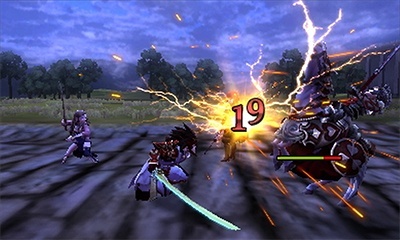
Challenge maps aren't the only way to break the game's difficulty though, the new My Castle features allows Corrin to visit other Avatars' castles and challenge them for skills and unit recruitment. Skills cost very little gold and recruiting a unit requires nothing other than winning the duel by routing or seizing. This can be easily exploited for army fodder or simply overpowered units that can clear chapters with little to no trouble.
Even if both of these potential advantages are ignored, Birthright will eventually present Corrin with its greatest unit, Ryoma. A unit so ridiculously overpowered that he can clear maps on Lunatic with little to no trouble. It says something negative when a legitimate strategy boils down to placing a unit down in the middle of a map and letting waves of enemies suicide themselves into him.
Still, the worst part isn't the bad story and cast or the exploitable game mechanics, it's the fact that it's overall just wasted potential. There's a lot of good under the bad here, and it's certainly not unplayable, but it doesn't present itself well enough. It very clear expects fans to play Conquest and Revelation to understand the story, as Birthright refuses to answer everything. It squanders the war narrative by framing Hoshido as overtly pure and Nohr as cartoonishly evil. It wastes otherwise great map design by presenting too many options to shatter any and every challenge, but worst of all, it's just very much one-third of a full game.
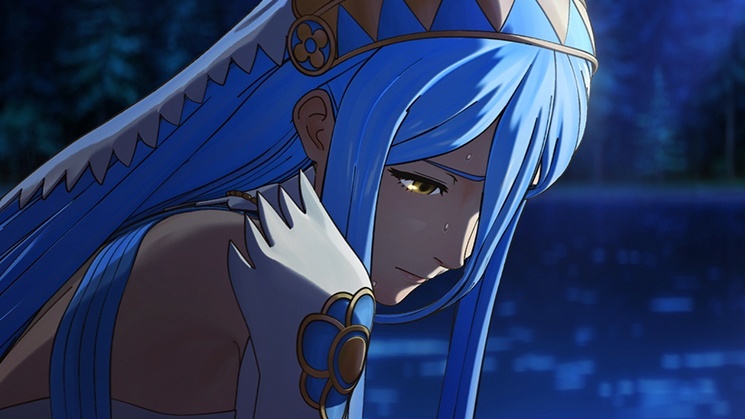
Cubed3 Rating
Good
While not a bad game, Fire Emblem Fates: Birthright is one of the biggest disappointments in the series in years. It manages to have more map variety than the previous instalment, but it's pitifully lacking in every other regard. Even with better map design, it's so poorly balanced that the hardest difficulty feels less like a challenge of skill and more like an endurance match of how long certain units can go without being used before frustration kicks in. With an even worse story being fronted by one of the worst casts in the series, Birthright offers very little in terms of series progression, instead opting for an incredibly safe experience that, while not bad, doesn't push the series forward either. With context needed from Conquest, Revelation, and DLC content to fully flesh out and understand the story, Birthright, and by extension Fates, sets a bad precedent for not just the rest of the series, but for video games themselves.
Comments
Comments are currently disabled

 Sign In
Sign In Game Details
Game Details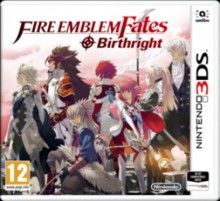
 Out now
Out now  Out now
Out now  Out now
Out now  Out now
Out now  Subscribe to this topic
Subscribe to this topic Features
Features





 Top
Top

